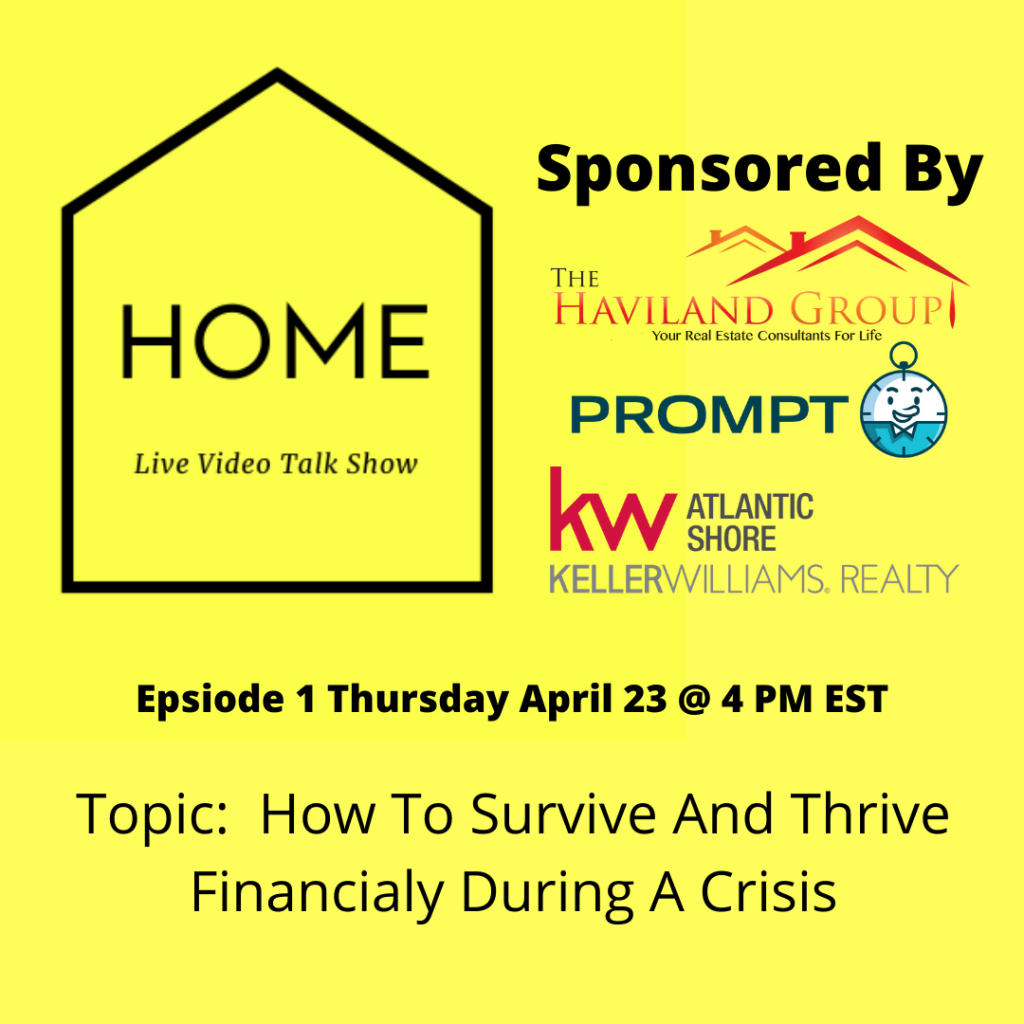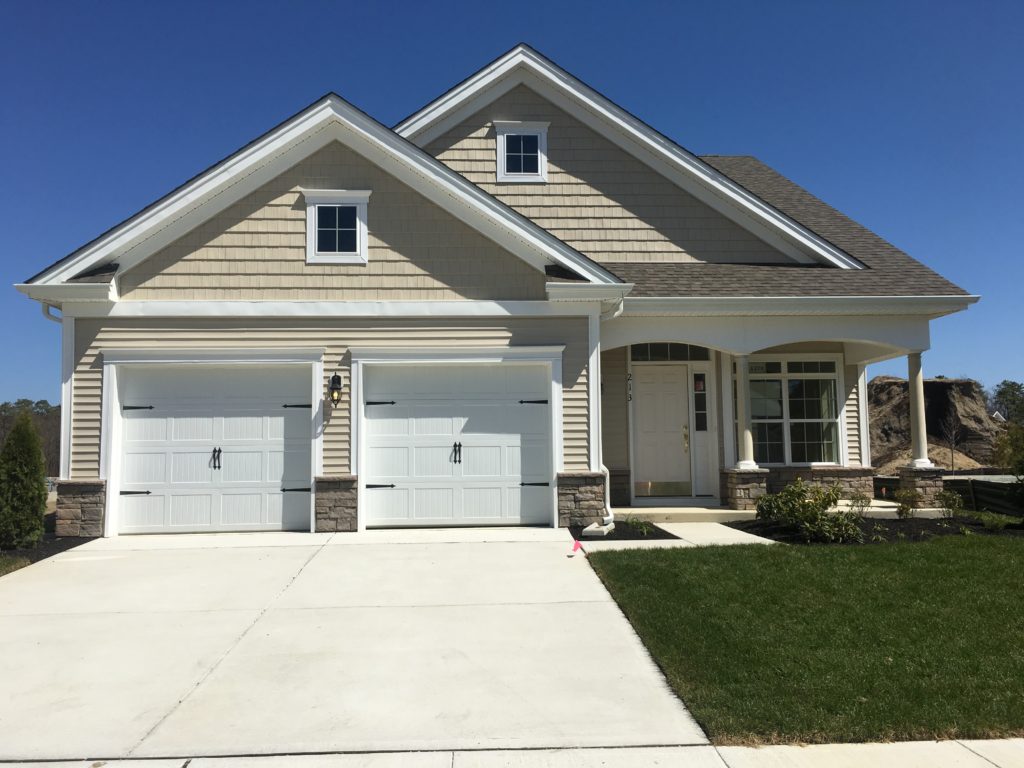Join us for a tour of this incredible building in my home town of Port Republic. In this video tour we see the entire church including the bell tower, steeple and the basement.
Tag Archives: Matt Haviland
Homes For Sale In Egg Harbor Township NJ London Court Condos
We just reduced the price on this fantastic home to $110,000. This 2 bedroom 1 bath condo is a first floor unit located in London Court in Egg Harbor Township, NJ. Contact us for more details.
How To Survive And Thrive Financially During A Crisis
Join us for our new live video talk show Thursday April 23rd at 4 PM.
In light of the current crisis, we want to help people survive and thrive financially during this time. Our new live video show will go over things like what bills to pay when you are limited on income. We’ll also talk about how to make money and look at employers that are hiring now. And we will highlight local people and businesses making a difference.
Here is a replay of the show and join us for our next episode at https://www.facebook.com/havilandgroup/
Love Life in Egg Harbor Township, NJ
Living and loving life in Egg Harbor Township, NJ 08234
Egg Harbor Township is an excellent place to put down roots and live within a home-town community.There are several neighborhoods which offer a variety of homes, both older and newer constructions, ideal for raising a family, creating a retreat away from work, or enjoying retirement. Whatever your lifestyle and personal needs for a house, Egg Harbor Township is a place worthy of calling home.
Life in Egg Harbor Township, NJ
Demographically speaking,Egg Harbor Township is a diverse community, in cultural heritage, education, and career/work background. With a larger proportion of the households being families, Egg Harbor Township provides excellent resources and amenities such as top-rated schools, parks and plenty of social opportunities, making it easy to connect with other families and build community bonds. With many neighborhoods and sections you’re sure to find the right one for you.
Situated along the New Jersey coastline, it’s easy to get out and experience the rugged beauty of the scenic, coastal landscape along Great Egg Harbor Bay and River, Tuckahoe Wildlife Management Area and Egg Harbor Township Nature Reserve; just to name a few spots wort checking out. With the New Jersey Pinelands National Reserve right in our backyard, an almost endless run of trails awaits exploration.
Fun Fact: Great Egg Harbor get its name from the vast number of bird eggs which covered the meadow lands along the bay and river shoreline.
Egg Harbor Township is located minutes from Atlantic City and Ocean City and all the great beach towns like Margate, Longport, Ventnor and Brigantine. Egg Harbor Township is located 1 hour from Philadelphia and two hours from New York City.
We have homes of all styles and budgets. From condos, single family homes, 55 and over communities and even riverfront and waterfront homes. Egg Harbor Township also offers new construction homes from some of the nations top builders. This community is also conveniently located near shopping, medical facilities and and great restaurants. Egg Harbor Township has a lot to offer come and see for yourself.
If you want to view homes in Egg Harbor Township, get the conversation started with me today at 609-338-3773 or contact me here.
Can a Short Sale Apply to a Commercial Property?

Short sales are one option property owners who need to let go of their real estate can look into. These types of sales are where an owner works with their lender to sell the property as quickly as possible at a lower price than what’s owed, with the goal of helping the lender recoup as much as they can on the loss of a property, while allowing the owner to get out from underneath a financial burden.
Can a Short Sale Apply to a Commercial Property?
Short sales are not something to be entered into lightly. They do provide a way to deal with a property which is underwater or valued at less than what is owed should financial strife be an issue preventing an owner from continuing to make their mortgage payments. The housing crisis of 2008 led to many homeowners opting for a short sale over foreclosure. Can a short sale apply to a commercial property?
The answer is yes, you can seek a short sale of your commercial property. You do need to show proof of hardship, reflecting why you are no longer able to pay the mortgage on the property. Just as with a residential property, if a commercial property owner isn’t able to meet the payments, provided you can market the property at its current value, a short sale can be an option over foreclosure.
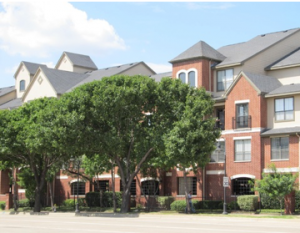 Being able to get at or close to the current market value of the property is key to getting lender approval and acceptance of a short sale; they want to recoup as much as they can after all. There’s one critical thing to keep in mind as a commercial property owner vs a residential owner however. It’s possible that your lender is more likely to take you to court for the remaining balance through seeking a Deficiency Judgment. This tends to be more prevalent with commercial properties compared to residential ones.
Being able to get at or close to the current market value of the property is key to getting lender approval and acceptance of a short sale; they want to recoup as much as they can after all. There’s one critical thing to keep in mind as a commercial property owner vs a residential owner however. It’s possible that your lender is more likely to take you to court for the remaining balance through seeking a Deficiency Judgment. This tends to be more prevalent with commercial properties compared to residential ones.
A Deficiency Judgment lawsuit can occur after a short sale and is an option for lenders to attempt to recoup more of the original loan. This is not to say it will happen, but it’s important if you’re considering a short sale on your commercial property that this could occur. Our goal in successful short sale negotiation is to have any deficiency forgiven.
If you’re facing financial distress and own commercial property, a short sale is one option to consider. Learn more about this and other options by contacting us.
When it’s time to sell or buy property, working with an experienced Realtor® who understands the local real estate market will make the process easier. I’m here and ready to get the conversation started with you. Call me today at 609-338-3773 or send me an e-mail. Myself and my team at The Haviland Group and Keller Williams Realty are ready to share our expertise and care for all your real estate needs.
How to Qualify for Government Grants to Buy a House

Government grants are an excellent resource of funding for buying a home, especially as grants, unlike loans, don’t need to be paid back. In getting a grant there’s a process to follow and qualifications to meet. With the various programs available there’s a chance you could be able to take advantage of a grant to help get you into your own home.
How to qualify for government grants to buy a house?
First you need to know what types of grants are available. There are some which will help lower the overall mortgage of a home while others help towards down payments and home improvements to be done after you move in. Here’s a list of some resources for grants worth looking into:
New Jersey HMFA Down Payment Assistance Program– Qualified buyers can get up to $10,000 to put towards a down payment on a house.
Teacher Next Door -A resource for public employees to get assistance- teachers, peace officers, firefighters, nurses and others- this site has helpful information for all public working sectors.
USDA Rural Development– There are a variety of grants available based on specified areas targeted for revitalization.
VA Grants for Disabled Veterans– These grants not only help vets get into home but also to modify a house as needed for comfortable living.
 Second you need to review the application process carefully, within this information you’ll find the specific qualifications which are needed to be able to apply for a government grant to buy a house. Often there are income limits, or you need to be part of a specific demographic such as being a military veteran, and you may need to be willing to live in certain areas. This is the case with USDA home loan grants which aim to revitalize rural communities with new home owners moving in.
Second you need to review the application process carefully, within this information you’ll find the specific qualifications which are needed to be able to apply for a government grant to buy a house. Often there are income limits, or you need to be part of a specific demographic such as being a military veteran, and you may need to be willing to live in certain areas. This is the case with USDA home loan grants which aim to revitalize rural communities with new home owners moving in.
Other qualifications may include a specified work history or minimum credit score. If you don’t meet these qualifications you may need wait a bit longer, until you’ve been at your job for the minimum amount f time or can get your credit score improved enough.
If this is you, don’t stress, just take the time and steps needed to get yourself where you need to be. Staying with one employer for the long-term and having a good credit score reflects how stable and responsibility you are, which is necessary for successful home ownership.
 The best way to take advantage of government grants to buy a home is to plan for it and then take action once you’re ready. When it’s time to buy a home, work with a Realtor® whose expertise can help you find solutions whatever your real estate needs may be. Get the conversation started with Matt Haviland, give him a call today at 609-338-3773 or send him an e-mail. The Haviland Group and Keller Williams Realty are ready to share their expertise and care for all your real estate needs.
The best way to take advantage of government grants to buy a home is to plan for it and then take action once you’re ready. When it’s time to buy a home, work with a Realtor® whose expertise can help you find solutions whatever your real estate needs may be. Get the conversation started with Matt Haviland, give him a call today at 609-338-3773 or send him an e-mail. The Haviland Group and Keller Williams Realty are ready to share their expertise and care for all your real estate needs.
Can You Qualify for a First-Time Buyer Mortgage?

If you’ve never bought a home before there are a wide range of first-time home buyer mortgage options available to help you get the keys to your first home. Depending on the funding program you choose as a first-time home buyer, different qualifications will need to be met.
Can You Qualify for a First-Time Buyer Mortgage?
When you’re ready to buy your first home it will be worth the effort to do some research to find the best first-time home buyer program for your specific situation. There are federally supported programs through the FHA, the VA and Fannie Mae for example, as well as state programs such as the New Jersey First-Time Home Buyer Program.
But what if you’ve owned a home in the past but have since sold it and weren’t in a position to buy a new home right away? Can you qualify for a first-time mortgage? Whatever the reason, if you owned a home in the past but currently don’t, you could qualify for a first-time mortgage. This applies even if you had previously bought a home through such a program. The key is how much time has passed since you last had such a mortgage.
As outlined by the FHA, so long as an applicant for a first-time mortgage has not owned their primary residence for at least 3 years prior to seeking a loan, they are considered a first-time home buyer and can seek out these types of loans and programs.
 There are additional parameters to meet in order to qualify for a first-time mortgage however, which will depend on which loan program you choose. Within the various programs available there will be income maximums, credit score minimums, job history minimums, and possibly down payment minimums.
There are additional parameters to meet in order to qualify for a first-time mortgage however, which will depend on which loan program you choose. Within the various programs available there will be income maximums, credit score minimums, job history minimums, and possibly down payment minimums.
Good Credit Score and Down Payment
Two of the toughest challenges to meet for many first-time home buyers are having a good credit score and acquiring the minimum down payment, but there’s no need to despair if this happens to be your situation. While it’s best to do what you can to improve your credit score, there are loan options available for those with less than ideal credit; they just come with a higher interest rate to help balance the risk ratio for the lender. The FHA is the prime source for low-credit buyers seeking a mortgage.
If you don’t have the money saved for a down payment there are different grants and programs which if you qualify, can provide part or all of your down payment monies. Here in New Jersey we have an excellent opportunity through The Road Home, an NJHMFA Down Payment Assistance Program. Qualifying first-time home buyers who get an NJHFMA First Mortgage Loan can get a $10,000 grant to put down towards a home.
When it’s time to buy a home, work with a Realtor® whose expertise can help you find solutions whatever your real estate needs may be. Get the conversation started with Matt Haviland, give him a call today at 609-338-3773 or send him an e-mail. The Haviland Group and Keller Williams Realty are ready to share their expertise and care for all your real estate needs.
Low Income Home Loan Options

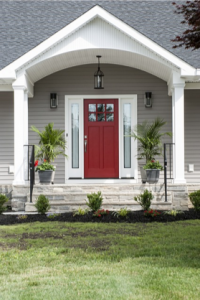 Owning a home is still the quintessential American Dream. Yet for many it can seem unattainable, especially if you have a low income. But don’t fret, a lower income doesn’t necessarily mean you can’t own a home, you just need to find the right loan.
Owning a home is still the quintessential American Dream. Yet for many it can seem unattainable, especially if you have a low income. But don’t fret, a lower income doesn’t necessarily mean you can’t own a home, you just need to find the right loan.
Low Income Home Loan Options
The first thing to determine is what type of loan you may qualify for within your income bracket. The Federal Housing Administration, or FHA is the place to begin. Run by the US HUD department, the FHA is in the business of helping people buy homes, especially those with lower incomes, or less-than-perfect credit. The FHA isn’t a lender, but they help insure the funding risk for a private lender as much as they help protect the home buyer in ways beyond what conventional loans are able to do.
Because loans backed by the FHA also provide low interest rate options and don’t require as much of a down payment, more families with lower incomes are able to qualify and afford a home loan, provided you qualify also as a first-time home buyer.
For definition purposes, a first-time home buyer is someone who hasn’t owned property for a three-year period or has met other criteria such as being a newly single parent who previously owned a home with their former spouse. Various situations apply to qualify as a first-time home buyer.
If you meet the parameters of being a first-time home buyer and your income is low enough to qualify, an FHA backed loan could be ideal for you. There are also state programs available in connection with the FHA/HUD Housing options, such as available through New Jersey. These are worth looking into you may be surprised by what you qualify for.
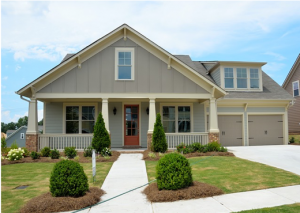 There are other programs which offer loans for qualified low income home buyers such through the USDA Direct Loan program, and the VA home loan offerings for military service men and women and their families. Another option worth considering if you’re up for a bit of home ownership education is the Fannie Mae HomeReady Mortgage.
There are other programs which offer loans for qualified low income home buyers such through the USDA Direct Loan program, and the VA home loan offerings for military service men and women and their families. Another option worth considering if you’re up for a bit of home ownership education is the Fannie Mae HomeReady Mortgage.
These loans are designed for lower income families who just need that extra boost to cross the threshold into home ownership. There’s a requirement to take a Homeowner Education course, which you can do online, to qualify. Getting educated to understand the course of homeownership and all the financial responsibilities that come with it is something that’s good for everyone. With just a bit of extra wok you could qualify for a great loan despite your lower income.
Within the state, New Jersey offers a First-Time Home Buyer Program with down payment assistance and loan options available to qualifying buyers. Also, worth looking into is the $10,000 grant provided through the NJ Home Seeker Program which Atlantic County is a participating county.
When it’s time to buy a home, work with a Realtor® whose expertise can help you find solutions whatever your real estate needs may be. Get the conversation started with Matt Haviland, give him a call today at 609-338-3773 or send him an e-mail. The Haviland Group and Keller Williams Realty are ready to share their expertise and care for all your real estate needs.
Is There a Magic Credit Score Number for Buying a House?

Once it’s time to buy a home, chances are you’ll need to get the funding through a mortgage loan. A house is not only one of the largest investments you can buy, owning one also comes with some risks. Houses can take a lot to maintain, and life changes, sometimes unexpectedly.
When asking a mortgage lender for a loan they need to find a way to help balance out the risks of loaning a large sum of money to an individual. Home buyers who are deemed “Credit Worthy” show a strong ability towards managing their money and keeping accounts in good standing. This is a large part of what makes you credit worthy in the eyes of a lender.
Is There a Magic Credit Score Number for Buying a House?
So how do lenders know you’re credit worthy or not? One of the first places they’ll look is your credit report. Your score reveals a lot about how financially reliable you are, so the better your score, the better the loan you’ll be able to get. What does your credit score have to be to buy a house?
 On average, most private lenders prefer to see scores from 620 on up. For a conventional loan you could say this is the magic number, but really, it’s just the beginning. Ultimately, the better your score the better your loan options will be. So, what if your score is below 620? If this is you, don’t count yourself out, organizations such as the FHA offer loan programs which you can get through your lender, that allow for a lower than stellar credit score. If you qualify along other basic parameters, such as income level, and current employment, owning a home with less than perfect credit is possible.
On average, most private lenders prefer to see scores from 620 on up. For a conventional loan you could say this is the magic number, but really, it’s just the beginning. Ultimately, the better your score the better your loan options will be. So, what if your score is below 620? If this is you, don’t count yourself out, organizations such as the FHA offer loan programs which you can get through your lender, that allow for a lower than stellar credit score. If you qualify along other basic parameters, such as income level, and current employment, owning a home with less than perfect credit is possible.
It’s still commendable and certainly recommended to strive for a better credit score before you buy a home if yours is on the lower end of the spectrum. If all other aspects apply, making an FHA loan still the ideal one for you, a higher credit score will get you better terms as credit scores also impact how much you pay for your loan in interest. This applies to conventional loans as well. The interest rate you’re offered by your lender is based in large part on your credit worthiness. A better score equals lower interest to pay, which in turn leads to a lower monthly mortgage, and possibly more home for less money out of pocket.
Before you get a loan get your credit report reviewed and corrected if needed. get the most from your credit score when buying a house. Contact us for a complementary credit score check and review. When it’s time to buy a home, work with a Realtor® who has a passion in helping their clients find solutions every step of the way. Get the conversation started with me today at 609-338-3773 or send me an e-mail. The Haviland Group and Keller Williams Realty are ready to share their expertise and care for all your real estate needs.
Use a Mortgage Payment Calculator to Help Find Your Atlantic County, NJ Home

When it’s time to buy a home, chances are you’ll need to find a lender and get a mortgage approved. It’s ideal to know ahead of time the maximum amount you’ll qualify for from your chosen lender. After you know how much of a loan you can get, and you begin house hunting, you’ll need to find out just how much a house will cost before you make an offer. So, how do you figure this out you may ask? This is where mortgage payment calculators come in.
When you can plan a budget before you buy a home you can save yourself a lot of time and potential money. By providing some basic information about a listing you’re interested in, with a mortgage payment calculator, you can get an estimate of the overall costs of a property, or several properties if you’re looking to compare.
Mortgage Payment Calculator for Atlantic County NJ
As an online resource, mortgage calculators can also give you an idea of what type of loan you may want to apply for. Through showing you variables, which impact mortgages such as interest rates and down payment amounts, you’ll be equipped to determine the best home loan budget for you. With the help of a mortgage payment calculator for buying a house in Atlantic County, NJ, you can get insight into what to expect, including taxes or HOA fees if they’re applicable.
As a home buyer, one of the best decisions you can make is to educate yourself about the process and how each step will affect you. You’ll have a lot of decisions to make; these are major financial and lifestyle decisions worth taking the time to understand so you can buy with confidence and be happy in your new home. When you utilize a tool such as a mortgage payment calculator you give yourself a valuable resource, knowledge.
Mortgage Calculator
You can find mortgage calculators through different lender and real estate sites, or check out the mortgage calculator below to begin. When it’s time to buy a home, work with a Realtor® who has a passion in helping their clients find solutions towards achieving their home dreams. Get the conversation started with Matt Haviland, give him a call today at 609-338-3773 or send him an e-mail. The Haviland Group and Keller Williams Realty are here to help you find the right home from start to finish.

